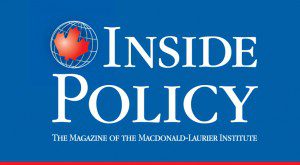 There is a gap between how the small business community and the government see the proposed small business tax reforms, writes Sean Speer. This has resulted in both sides talking past each other.
There is a gap between how the small business community and the government see the proposed small business tax reforms, writes Sean Speer. This has resulted in both sides talking past each other.
By Sean Speer, Sept. 15, 2017
One of the peculiarities of the small business tax controversy is the gap between the public’s perception and the government’s assumptions. It’s not clear to me who is right. It’s hard to judge. An “all-knowingness” has marked the rhetoric on both sides with some exceptions, of course. It’s not the only reason that the government’s proposed changes have become so controversial but it’s a big part of the story here.
The small business community is ostensibly assuming that the government’s proposed changes will have broad-based application and Ottawa is ostensibly assuming it will only affect a narrow subset.
Why do I say “ostensibly”? It’s an observation based on what the two sides are saying and doing. The magnitude of the small business response suggests that many business owners assume that they will be affected by a combination of the proposed changes to “income sprinkling,” passive income, and the tax treatment of the conversion to capital gains. The government’s modest revenue estimate of $250M assumes only a small number will be.
Put differently: the gap is between an assumption that these tax planning activities are widely used and that this is only about a small group of “wealthy folks,” as the Prime Minister has said.
This gap is, in my view, an underexplored part of this whole episode. It’s a good reminder of the virtues of intellectual humility in the public policy arena.
Let’s start with the government’s underlying assumptions first. The government’s revenue estimate amounts to about as much as Ottawa collects every 7 hours. It represents less than a quarter of the revenue loss associated with a 1-percentage point reduction in the small business tax rate for all affected businesses. The Prime Minister’s comment about “a little tweak” is consistent with the Finance Department’s projected revenue gains.
The gap is between an assumption that these tax planning activities are widely used and that this is only about a small group of “wealthy folks.”
As for the small business reaction, the level of concern is understandable. Part of it is invariably a result of the limited details set out by Ottawa thus far. It’s the equivalent of telling five employees that one will be fired without any further information. It’s only logical for all five to be worried about the outcome.
But part of it may be more than simply a matter of poor communications. There may be a more fundamental gap here between perception and reality.
On one hand, the government and other voices in favour of the proposed changes contend that “misinformation” has contributed to a large number of business owners wrongly assuming that they will be affected. There’s no doubt some truth to this. This issue has taken on a bit of a life of its own in the sleepy summer months. Claims about fleeing tech entrepreneurs or the demise of the family farm are invariably exaggerated.
On the other hand, it’s quite possible that the Department of Finance has misjudged the magnitude of use of these tax planning activities. It’s notable, for instance, that the department’s consultation document provides mostly theoretical examples or circumstantial evidence (such as the increase in the number of incorporated companies) rather than any concrete analysis of the problem. Ottawa’s revenue estimates may thus significantly underestimate how many small businesses will be affected and in turn the size of the resulting tax bill on doctors, entrepreneurs, lawyers, and other small businesses.
It wouldn’t be the first time. Government officials are not infallible. The department has previously misread similar issues – including its 2013 assumption that clarifying the GST/HST tax treatment of hospital parking would affect virtually no one (the budget change anticipated no revenue) only to discover that it had broad-based implications.
The truth is we just don’t know. While we may have greater insight in the future as these policy changes play themselves out, we’ll never fully understand how precisely the reforms affected business formation, investment choices, or other individualized decision-making. One suspects that there will be sufficient evidence on both sides of the issue for small businesses and the government to claim their respective positions have been proven.
Our economy and society are complicated and even well-intended policies can (and often do) produce negative effects.
The principal lesson is, as economist Russ Roberts notes, about recognizing what we know, what we don’t know, and what we may never know. Policymaking ought to start with greater humility – especially since the consequences are often inadvertent and even “unseen.”
Of course, this doesn’t mean that we should throw away facts and evidence. Data are a key input into the policy-making process. They can help us determine priorities, inform policy development and design, and ultimately make some judgements about what’s working and what’s not. There is such a thing as “evidence-based policy.” Or, at minimum, there’s such a thing as “non-evidence-based policy” which neglects experience, trade-offs, or the role of incentives.
But it does mean that policymakers ought to be more cautious. The threshold for policy intervention should be high. Our economy and society are complicated and even well-intended policies can (and often do) produce negative effects. Choosing to defer to market or civil society outcomes isn’t therefore an abdication or a sign that the government doesn’t care. Government inaction is more often than not the right policy choice.
At the time of writing it seems likely that Ottawa proceeds with its proposed reforms in spite of considerable small business opposition. One gets the sense is in large part because the two sides are talking past each other. An assumption gap is mostly to blame. Greater humility may help to bridge it.
Sean Speer is a Munk senior fellow at the Macdonald-Laurier Institute.





